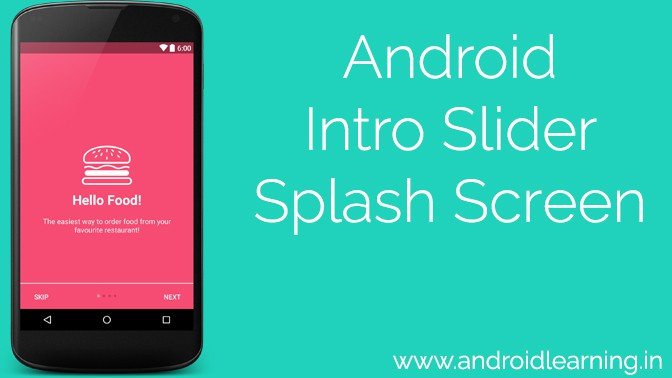Adding Welcome / Intro slider screens in your app is a great way of showcasing the major features of the app. In this article we are going to learn how to add an intro slider to your app where user can swipe through few slides before getting into app.
To demonstrate, I am creating a simple app that contains few intro slides with next and skip navigation. The user can navigate through each slide using swipe gesture or using the next button. I’ll also explain how to show the intro only when the app is launched for the first time.
Let’s start by creating a new project.
1. Creating New Project
- Create a new project in Android Studio from File ⇒ New Project. When it prompts you to select the default activity, select Empty Activity and proceed.
- Download this res.zip and add them to your projects res folder. This zip file contains few drawable images required for this app.
2. Choosing the Colors
It’s completely upto you how you design the intro screens considering the type of app you are building. For this example, I am placing a big image in centre and few texts below it. At the bottom, number of dots are placed indicating the number of slides it has.
Below is the color palette I have selected to design the screens. For every screen we need three colors i.e background color and two dot colors when it is active / inactive.

- Open colors.xml located under res ⇒ values and add the below color values. You can see after adding the colors, I have kept them into arrays array_dot_active and array_dot_inactive, so that we can load them easily in our activity.
<?xml version="1.0" encoding="utf-8"?> <resources> <color name="colorPrimary">#3F51B5</color> <color name="colorPrimaryDark">#303F9F</color> <color name="colorAccent">#FF4081</color> <!-- Screens background color--> <color name="bg_screen1">#f64c73</color> <color name="bg_screen2">#20d2bb</color> <color name="bg_screen3">#3395ff</color> <color name="bg_screen4">#c873f4</color> <!-- dots inactive colors --> <color name="dot_dark_screen1">#d1395c</color> <color name="dot_dark_screen2">#14a895</color> <color name="dot_dark_screen3">#2278d4</color> <color name="dot_dark_screen4">#a854d4</color> <!-- dots active colors --> <color name="dot_light_screen1">#f98da5</color> <color name="dot_light_screen2">#8cf9eb</color> <color name="dot_light_screen3">#93c6fd</color> <color name="dot_light_screen4">#e4b5fc</color> <array name="array_dot_active"> <item>@color/dot_light_screen1</item> <item>@color/dot_light_screen2</item> <item>@color/dot_light_screen3</item> <item>@color/dot_light_screen4</item> </array> <array name="array_dot_inactive"> <item>@color/dot_dark_screen1</item> <item>@color/dot_dark_screen2</item> <item>@color/dot_dark_screen3</item> <item>@color/dot_dark_screen4</item> </array> </resources> - Open strings.xml located under res ⇒ values and add the below string values. Here I am mentioning a title and description for each slide.
<resources> <string name="app_name">Intro Slider</string> <string name="title_activity_welcome">Home Screen</string> <string name="next">NEXT</string> <string name="skip">SKIP</string> <string name="start">GOT IT</string> <string name="slide_1_title">Hello Food!</string> <string name="slide_1_desc">The easiest way to order food from your favourite restaurant!</string> <string name="slide_2_title">Movie Tickets</string> <string name="slide_2_desc">Book movie tickets for your family and friends!</string> <string name="slide_3_title">Great Discounts</string> <string name="slide_3_desc">Best discounts on every single service we offer!</string> <string name="slide_4_title">World Travel</string> <string name="slide_4_desc">Book tickets of any transportation and travel the world!</string> <string name="play_again_desc">To see the welcome slider again, goto Settings -> apps -> welcome slider -> clear data</string> <string name="play_again">Play Again</string> </resources> - Open dimens.xml located under res ⇒ values and add the below values.
<resources> <!-- Default screen margins, per the Android Design guidelines. --> <dimen name="activity_horizontal_margin">16dp</dimen> <dimen name="activity_vertical_margin">16dp</dimen> <dimen name="fab_margin">16dp</dimen> <dimen name="dots_height">30dp</dimen> <dimen name="dots_margin_bottom">20dp</dimen> <dimen name="img_width_height">120dp</dimen> <dimen name="slide_title">30dp</dimen> <dimen name="slide_desc">16dp</dimen> <dimen name="desc_padding">40dp</dimen> </resources> - Also make sure that you have these styles in your styles.xml as the app is crashing because of recent changes in build tools.
<resources> <!-- Base application theme. --> <style name="AppTheme" parent="Theme.AppCompat.Light.DarkActionBar"> <!-- Customize your theme here. --> <item name="colorPrimary">@color/colorPrimary</item> <item name="colorPrimaryDark">@color/colorPrimaryDark</item> <item name="colorAccent">@color/colorAccent</item> </style> <style name="AppTheme.NoActionBar"> <item name="windowActionBar">false</item> <item name="windowNoTitle">true</item> </style> </resources>The welcome / intro slider should be shown only once when the app is launched for the very first time. If the user launches the app on second time, he should directly go to main screen. To achieve this, we use SharedPreferences to store a boolean value indicating first time launch.
- Create a class named Session.java and do the below changes. isFirstTimeLaunch() returns true if the app is launched for the first time.
package org.snowcorp.app; import android.content.Context; import android.content.SharedPreferences; /** * Created by Akshay Raj on 7/28/2016. * Snow Corporation Inc. * www.snowcorp.org */ public class Session { SharedPreferences pref; SharedPreferences.Editor editor; Context _context; // shared pref mode int PRIVATE_MODE = 0; // Shared preferences file name private static final String PREF_NAME = "snow-intro-slider"; private static final String IS_FIRST_TIME_LAUNCH = "IsFirstTimeLaunch"; public Session(Context context) { this._context = context; pref = _context.getSharedPreferences(PREF_NAME, PRIVATE_MODE); editor = pref.edit(); } public void setFirstTimeLaunch(boolean isFirstTime) { editor.putBoolean(IS_FIRST_TIME_LAUNCH, isFirstTime); editor.commit(); } public boolean isFirstTimeLaunch() { return pref.getBoolean(IS_FIRST_TIME_LAUNCH, true); } }
3. Creating the Welcome Slides
Now it’s time to create the layouts required for the slider. In total I am keeping 4 slides for the intro screen. So we need four separate layouts for four slide. The layout of each slide remains the same except the images, text and colors. Alternatively you can create separate Fragment for each slide to have more control over the UI elements displayed in the slide.
- So quickly create four xml layouts named welcome_side1.xml, welcome_side2.xml, welcome_side3.xml andwelcome_side4.xml under res ⇒ layouts.
welcome_slide1.xml
<?xml version="1.0" encoding="utf-8"?> <RelativeLayout xmlns:android="http://schemas.android.com/apk/res/android" android:layout_width="match_parent" android:layout_height="match_parent" android:background="@color/bg_screen1"> <LinearLayout android:layout_width="wrap_content" android:layout_height="wrap_content" android:layout_centerInParent="true" android:gravity="center_horizontal" android:orientation="vertical"> <ImageView android:layout_width="@dimen/img_width_height" android:layout_height="@dimen/img_width_height" android:src="@drawable/ic_food" /> <TextView android:layout_width="wrap_content" android:layout_height="wrap_content" android:text="@string/slide_1_title" android:textColor="@android:color/white" android:textSize="@dimen/slide_title" android:textStyle="bold" /> <TextView android:layout_width="wrap_content" android:layout_height="wrap_content" android:layout_marginTop="20dp" android:paddingLeft="@dimen/desc_padding" android:paddingRight="@dimen/desc_padding" android:text="@string/slide_1_desc" android:textAlignment="center" android:textColor="@android:color/white" android:textSize="@dimen/slide_desc" /> </LinearLayout> </RelativeLayout>welcome_slide2.xml<?xml version="1.0" encoding="utf-8"?> <RelativeLayout xmlns:android="http://schemas.android.com/apk/res/android" android:layout_width="match_parent" android:layout_height="match_parent" android:background="@color/bg_screen2"> <LinearLayout android:layout_width="wrap_content" android:layout_height="wrap_content" android:layout_centerInParent="true" android:gravity="center_horizontal" android:orientation="vertical"> <ImageView android:layout_width="@dimen/img_width_height" android:layout_height="@dimen/img_width_height" android:src="@drawable/ic_movie" /> <TextView android:layout_width="wrap_content" android:layout_height="wrap_content" android:text="@string/slide_2_title" android:textColor="@android:color/white" android:textSize="@dimen/slide_title" android:textStyle="bold" /> <TextView android:layout_width="wrap_content" android:layout_height="wrap_content" android:layout_marginTop="20dp" android:paddingLeft="@dimen/desc_padding" android:paddingRight="@dimen/desc_padding" android:text="@string/slide_2_desc" android:textAlignment="center" android:textColor="@android:color/white" android:textSize="@dimen/slide_desc" /> </LinearLayout> </RelativeLayout>welcome_slide3.xml<?xml version="1.0" encoding="utf-8"?> <RelativeLayout xmlns:android="http://schemas.android.com/apk/res/android" android:layout_width="match_parent" android:layout_height="match_parent" android:background="@color/bg_screen3"> <LinearLayout android:layout_width="wrap_content" android:layout_height="wrap_content" android:layout_centerInParent="true" android:gravity="center_horizontal" android:orientation="vertical"> <ImageView android:layout_width="@dimen/img_width_height" android:layout_height="@dimen/img_width_height" android:src="@drawable/ic_discount" /> <TextView android:layout_width="wrap_content" android:layout_height="wrap_content" android:text="@string/slide_3_title" android:textColor="@android:color/white" android:textSize="@dimen/slide_title" android:textStyle="bold" /> <TextView android:layout_width="wrap_content" android:layout_height="wrap_content" android:layout_marginTop="20dp" android:paddingLeft="@dimen/desc_padding" android:paddingRight="@dimen/desc_padding" android:text="@string/slide_3_desc" android:textAlignment="center" android:textColor="@android:color/white" android:textSize="@dimen/slide_desc" /> </LinearLayout> </RelativeLayout>welcome_slide4.xml<?xml version="1.0" encoding="utf-8"?> <RelativeLayout xmlns:android="http://schemas.android.com/apk/res/android" android:layout_width="match_parent" android:layout_height="match_parent" android:background="@color/bg_screen4"> <LinearLayout android:layout_width="wrap_content" android:layout_height="wrap_content" android:layout_centerInParent="true" android:gravity="center_horizontal" android:orientation="vertical"> <ImageView android:layout_width="@dimen/img_width_height" android:layout_height="@dimen/img_width_height" android:src="@drawable/ic_travel" /> <TextView android:layout_width="wrap_content" android:layout_height="wrap_content" android:text="@string/slide_4_title" android:textColor="@android:color/white" android:textSize="@dimen/slide_title" android:textStyle="bold" /> <TextView android:layout_width="wrap_content" android:layout_height="wrap_content" android:layout_marginTop="20dp" android:paddingLeft="@dimen/desc_padding" android:paddingRight="@dimen/desc_padding" android:text="@string/slide_4_desc" android:textAlignment="center" android:textColor="@android:color/white" android:textSize="@dimen/slide_desc" /> </LinearLayout> </RelativeLayout> - Once the layouts are ready, create a new activity named WelcomeActivity.java for the welcome slider. Right Click on package New ⇒ Activity ⇒ Empty Activity.
- Open activity_welcome.xml and modify the code as below. Here I am adding ViewPager for slider,LinearLayout for bottom dots and two buttons for Skip and Next navigation.
<?xml version="1.0" encoding="utf-8"?> <RelativeLayout xmlns:android="http://schemas.android.com/apk/res/android" xmlns:app="http://schemas.android.com/apk/res-auto" xmlns:tools="http://schemas.android.com/tools" android:layout_width="match_parent" android:layout_height="match_parent" tools:showIn="@layout/activity_welcome"> <android.support.v4.view.ViewPager android:id="@+id/view_pager" android:layout_width="match_parent" android:layout_height="match_parent" /> <LinearLayout android:id="@+id/layoutDots" android:layout_width="match_parent" android:layout_height="@dimen/dots_height" android:layout_alignParentBottom="true" android:layout_marginBottom="@dimen/dots_margin_bottom" android:gravity="center" android:orientation="horizontal"> </LinearLayout> <View android:layout_width="match_parent" android:layout_height="1dp" android:alpha=".5" android:layout_above="@id/layoutDots" android:background="@android:color/white" /> <Button android:id="@+id/btn_next" android:layout_width="wrap_content" android:layout_height="wrap_content" android:layout_alignParentBottom="true" android:layout_alignParentRight="true" android:background="@null" android:text="@string/next" android:textColor="@android:color/white" /> <Button android:id="@+id/btn_skip" android:layout_width="wrap_content" android:layout_height="wrap_content" android:layout_alignParentBottom="true" android:layout_alignParentLeft="true" android:background="@null" android:text="@string/skip" android:textColor="@android:color/white" /> </RelativeLayout> - Open WelcomeActivity.java and modify the code as below. Here I have taken care of few things
1. Check for the fist time app launch using prefManager.isFirstTimeLaunch() method. If it returns true,MainActivity will be launched skipping the intro activity.
2. Made the notification bar transparent, so that the view background color can be seen through.
3. Created a PagerAdapter for the ViewPager and inflated all the layouts we created earlier.
4. Added click event listener to Skip and Next buttons. If next button is clicked, next slide will be shown. If Skip button is clicked, main activity will be launched directly.package org.snowcorp.app; import android.content.Context; import android.content.Intent; import android.graphics.Color; import android.os.Build; import android.os.Bundle; import android.support.v4.view.PagerAdapter; import android.support.v4.view.ViewPager; import android.support.v7.app.AppCompatActivity; import android.text.Html; import android.view.LayoutInflater; import android.view.View; import android.view.ViewGroup; import android.view.Window; import android.view.WindowManager; import android.widget.Button; import android.widget.LinearLayout; import android.widget.TextView; /** * Created by Akshay Raj on 7/28/2016. * Snow Corporation Inc. * www.snowcorp.org */ public class WelcomeActivity extends AppCompatActivity { private ViewPager viewPager; private MyViewPagerAdapter myViewPagerAdapter; private LinearLayout dotsLayout; private TextView[] dots; private int[] layouts; private Button btnSkip, btnNext; private Session session; @Override protected void onCreate(Bundle savedInstanceState) { super.onCreate(savedInstanceState); // Checking for first time launch - before calling setContentView() session = new Session(this); if (!session.isFirstTimeLaunch()) { launchHomeScreen(); finish(); } // Making notification bar transparent if (Build.VERSION.SDK_INT >= 21) { getWindow().getDecorView().setSystemUiVisibility(View.SYSTEM_UI_FLAG_LAYOUT_STABLE | View.SYSTEM_UI_FLAG_LAYOUT_FULLSCREEN); } setContentView(R.layout.activity_welcome); viewPager = (ViewPager) findViewById(R.id.view_pager); dotsLayout = (LinearLayout) findViewById(R.id.layoutDots); btnSkip = (Button) findViewById(R.id.btn_skip); btnNext = (Button) findViewById(R.id.btn_next); // layouts of all welcome sliders // add few more layouts if you want layouts = new int[]{ R.layout.welcome_slide1, R.layout.welcome_slide2, R.layout.welcome_slide3, R.layout.welcome_slide4}; // adding bottom dots addBottomDots(0); // making notification bar transparent changeStatusBarColor(); myViewPagerAdapter = new MyViewPagerAdapter(); viewPager.setAdapter(myViewPagerAdapter); viewPager.addOnPageChangeListener(viewPagerPageChangeListener); btnSkip.setOnClickListener(new View.OnClickListener() { @Override public void onClick(View v) { launchHomeScreen(); } }); btnNext.setOnClickListener(new View.OnClickListener() { @Override public void onClick(View v) { // checking for last page // if last page home screen will be launched int current = getItem(+1); if (current < layouts.length) { // move to next screen viewPager.setCurrentItem(current); } else { launchHomeScreen(); } } }); } private void addBottomDots(int currentPage) { dots = new TextView[layouts.length]; int[] colorsActive = getResources().getIntArray(R.array.array_dot_active); int[] colorsInactive = getResources().getIntArray(R.array.array_dot_inactive); dotsLayout.removeAllViews(); for (int i = 0; i < dots.length; i++) { dots[i] = new TextView(this); dots[i].setText(Html.fromHtml("•")); dots[i].setTextSize(35); dots[i].setTextColor(colorsInactive[currentPage]); dotsLayout.addView(dots[i]); } if (dots.length > 0) dots[currentPage].setTextColor(colorsActive[currentPage]); } private int getItem(int i) { return viewPager.getCurrentItem() + i; } private void launchHomeScreen() { session.setFirstTimeLaunch(false); startActivity(new Intent(WelcomeActivity.this, MainActivity.class)); finish(); } // viewpager change listener ViewPager.OnPageChangeListener viewPagerPageChangeListener = new ViewPager.OnPageChangeListener() { @Override public void onPageSelected(int position) { addBottomDots(position); // changing the next button text 'NEXT' / 'GOT IT' if (position == layouts.length - 1) { // last page. make button text to GOT IT btnNext.setText(getString(R.string.start)); btnSkip.setVisibility(View.GONE); } else { // still pages are left btnNext.setText(getString(R.string.next)); btnSkip.setVisibility(View.VISIBLE); } } @Override public void onPageScrolled(int arg0, float arg1, int arg2) { } @Override public void onPageScrollStateChanged(int arg0) { } }; /** * Making notification bar transparent */ private void changeStatusBarColor() { if (Build.VERSION.SDK_INT >= Build.VERSION_CODES.LOLLIPOP) { Window window = getWindow(); window.addFlags(WindowManager.LayoutParams.FLAG_DRAWS_SYSTEM_BAR_BACKGROUNDS); window.setStatusBarColor(Color.TRANSPARENT); } } /** * View pager adapter */ public class MyViewPagerAdapter extends PagerAdapter { private LayoutInflater layoutInflater; public MyViewPagerAdapter() { } @Override public Object instantiateItem(ViewGroup container, int position) { layoutInflater = (LayoutInflater) getSystemService(Context.LAYOUT_INFLATER_SERVICE); View view = layoutInflater.inflate(layouts[position], container, false); container.addView(view); return view; } @Override public int getCount() { return layouts.length; } @Override public boolean isViewFromObject(View view, Object obj) { return view == obj; } @Override public void destroyItem(ViewGroup container, int position, Object object) { View view = (View) object; container.removeView(view); } } } - Finally open AndroidManifest.xml and make WelcomeActivity as launcher activity. So that it will be shown as the first screen in the app.
<?xml version="1.0" encoding="utf-8"?> <manifest xmlns:android="http://schemas.android.com/apk/res/android" package="org.snowcorp.app"> <application android:allowBackup="true" android:icon="@mipmap/ic_launcher" android:label="@string/app_name" android:supportsRtl="true" android:theme="@style/AppTheme"> <activity android:name=".WelcomeActivity" android:screenOrientation="portrait" android:theme="@style/AppTheme.NoActionBar"> <intent-filter> <action android:name="android.intent.action.MAIN" /> <category android:name="android.intent.category.LAUNCHER" /> </intent-filter> </activity> <activity android:name=".MainActivity" android:label="@string/app_name"> </activity> </application> </manifest>
Run the app and play with awesomely looking intro sliders.
Final Output :-



andro hive has the same thing
Because I also like AndroidHive
getting error on isFirstTimeLaunch .
Help asap.
what error?